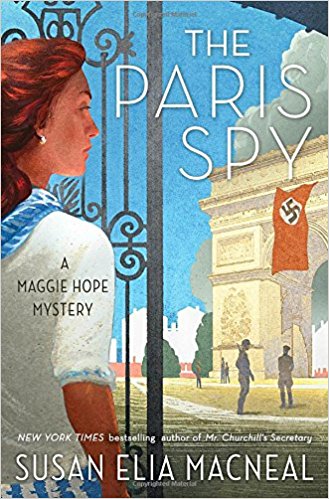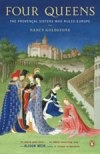 Moonshine here does not mean Tennessee hooch, though this being Wodehouse, the characters tend to reach for potent liquid bracers at key plot points. Here, moonshine takes the British connotation of nonsense or silliness. Certainly, this novel has a carefree absurdity which reminded me a bit of Shakespeare’s A Midsummer Night’s Dream. (Wodehouse was devoted to Shakespeare.) There is a cast of wacky characters all gathered at Walsingford Hall, which is repeatedly described as one of England’s ugliest country houses, “in all its revolting hideousness.” The summer retreat proves a hotspot for all sorts of mix-ups, including crossed identities, romantic entanglements, and chases down country lanes, as well as through the many closets of Walsingford Hall.
Moonshine here does not mean Tennessee hooch, though this being Wodehouse, the characters tend to reach for potent liquid bracers at key plot points. Here, moonshine takes the British connotation of nonsense or silliness. Certainly, this novel has a carefree absurdity which reminded me a bit of Shakespeare’s A Midsummer Night’s Dream. (Wodehouse was devoted to Shakespeare.) There is a cast of wacky characters all gathered at Walsingford Hall, which is repeatedly described as one of England’s ugliest country houses, “in all its revolting hideousness.” The summer retreat proves a hotspot for all sorts of mix-ups, including crossed identities, romantic entanglements, and chases down country lanes, as well as through the many closets of Walsingford Hall.
The story starts off on a languorous summer day. The guests idled over croquet and sunbathed by the river, while cows grazed in the distance. To this, enters Miss Prudence Whitaker, “who spoke in a cold crisp voice which sounded in the drowsy stillness like ice tinkling in a pitcher.” We soon learn that Prudence is somewhat of a hotel manager, and these are paying guests. Her boss, Sir Buckstone Abbot, is short on cash, and the setup is a bit like Downton Abbey meets the “Island of Misfit Toys.”
The brooding Sir Buckstone does not feel that he is getting paid enough to have these interlopers trampling about his house, drinking his port, and asking for waffles at breakfast. “A bee buzzed past his nose and he gave it a cold look.” Indeed, his financial predicament had engendered in him a great admiration for the money-squeezing character of Shylock.
Sir Buckstone’s daughter Jane has her own troubles. “It ruffles a girl of sensibility, who shortly after breakfast has heard the man she loves called a twerp and … a few hours later, at luncheon, described as a kickworthy heel.”
There are also two befuddled, and rather Bertie Wooster-esque, brothers named Vanringham. Joe, an aspiring playwright, spends his time doodling mustaches on the statues that decorate the grounds. “There is nothing like creative work in fine weather for releasing the artistic spririt.” His brother Tubby, also a daydreamer, “from the age of fourteen onward, had been unable to see a girl on the distant horizon without wanting to send her violets and secure her telephone number.”
Into this, pushes in the brash, uninvited, “blighter” of an American relative, Mr. Sam Bullpitt, who is actually a process server chasing down one of the aforementioned Vanringhams.
The other guests serve as obstacles and comic relief in this roundabout game of chase. Upon discovering that Tubby (last seen attempting to read a dullish mystery called “Murder at Bilbury Manor”) has disappeared, Joe interrupts the golf practice of an aged Mr. Waugh-Bonner.
“‘My name is Vanringham. My brother was sitting under the cedar.’
‘Hey? Oh, you mean that young fellow? You his brother?’
‘Yes, Have you seen him?’
‘Of course I have seen him.’
‘Where?’
‘Sitting under the cedar,’ said Mr Waugh-Bonner, with the manner of a man answering an easy one, and turned to address his ball.
It seemed for a moment as if there might be murder at Walsingford Hall as well as at Bilbury Manor, but, with a powerful effort, Joe restrained himself from snatching the putter from this obtuse septuagenarian and beating out his brains, if you could call them that. He even waited until the other had completed his stoke—another miss.
‘He’s not sitting there now.’
‘Of course, he’s not. How could he be when he’s gone for a walk?’
‘Walk? Where?’
‘Where what?’
‘Which way was he heading and when did he leave?’
‘Started out along the Walsingford road twenty minutes ago,’ said Mr Waugh-Bonner, and snorted irritably as his companion left him like a bullet from a gun. He disliked all young men, but he hated jumpy ones.”
 There are several other eccentric characters—the ‘kickworthy’ fortune hunter Adrian Peake, the faux Czech Princess Dwornitzcheck, a shuffling butler named Pollen, and the waffle-requesting Mr Chinnery, to whom Sir Buckstone owes a large sum of money—and several of them seem to be chasing each other about.
There are several other eccentric characters—the ‘kickworthy’ fortune hunter Adrian Peake, the faux Czech Princess Dwornitzcheck, a shuffling butler named Pollen, and the waffle-requesting Mr Chinnery, to whom Sir Buckstone owes a large sum of money—and several of them seem to be chasing each other about.
Slight spoiler alert: there is a dust-up in which Joe Vanringham is set upon by a group of large, menacing, factory workers. Turns out, it’s a biscuit factory (that’s what the Brits call cookies), and suddenly the cookie makers seem much more comedy than tragedy. They all end up slinging pints, not fists, at the local pub. It is Wodehouse after all.
I don’t want to downplay this masterpiece as complete gush. Wodehouse was markedly cerebral, and he was alone, unequaled, in his ability to write smart, and most hilarious, novels. Nary a page goes by without a reference to classical Greek or Roman mythology, Classical Opera, Shakespeare, or British history. Joe Vanringham, before he secures a room at Walsingford Hall, feels himself “a peri at the gate of Paradise.” But that is for another blog post. Always, Wodehouse does it so seamlessly, that a reader could completely miss these citations and just enjoy the comedic flow.
The plot is delightfully fluffy and bubbles along in a series of inane incidents that highlight the joys of summertime in the English countryside. Yes, I laughed and smiled on every page—a perfect sunny, summer read.
The Paris Review Interview of P.G. Wodehouse
Check Out WordHits on Facebook





